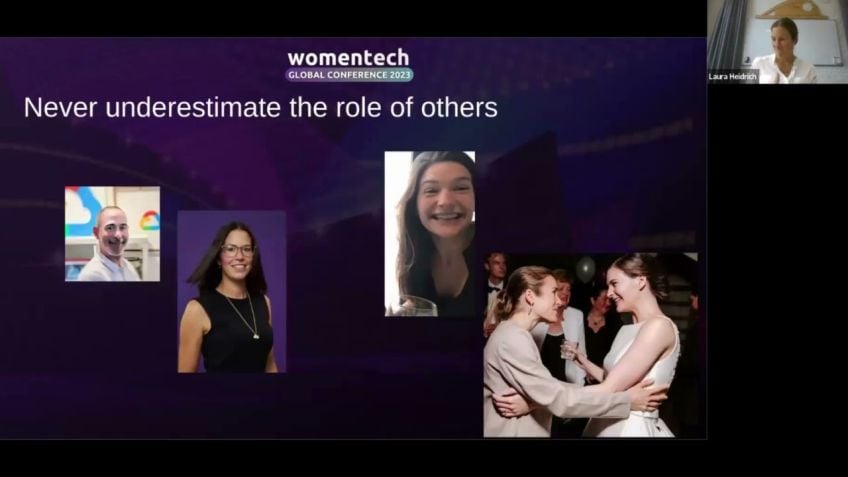A Journey from Individual Contributor to Managerial Success
The Journey From Individual Software Engineer to Engineering Manager
Hello, everyone, I'm Ritulina John, and I'm thrilled to share my voyage from being an individual contributor as a software engineer, to entering into an engineering manager role.
A Bit About My Background
My journey began while pursuing my masters in computer science in USC, LA, which led me to my first full-time job at Oracle. After spending about two and a half years at Oracle, I moved to a start-up, CoreOS, where I delved into different roles beyond just software engineering. But the real thrill began when I joined Lyft.
My Journey at Lyft
At Lyft, I started off as a software engineer, eventually moving into the world of management. Here's a brief on how that happened:
- I joined the infrastructure organization, providing a strong foundation in working with stakeholders and customers
- I also learned how to build resilient clusters and effective tools to aid developers in the company
- Finally, I found my first opportunity in management in the developer environments team
I grounded my journey with a strong "why" statement. The joy I found in collaborating and mentoring people outshone that of writing code, and this gave me the initial push into the world of management.
Essential Skills On My Management Journey
Undoubtedly, becoming a manager involves honing new skills. Here are some of the key ones that I developed:
- Coaching: Unlocking the potential of your direct reports is a key duty as a manager. I personally found the "grow" model invaluable in grounding my coaching in goals.
- Providing Effective Feedback: Giving critical feedback can be tricky, but it becomes easier once rooted in a place of trust and care.
- Leading Without Charge: Even before getting a title, pedaling your leadership instincts by inspiring colleagues with your ideas is a good move.
In addition to skills, my journey taught me to advocate for my opportunities. Visibility is essential. Don't be afraid to showcase your success and celebrate your wins; it shows you can drive your career development.
Conclusion
In conclusion, embarking on any journey requires a clear why statement to keep you motivated and a calculated how for guidance. But most importantly, understand that you are the driver of your own career development. Ensure you're always learning because learning never stops. If you have any questions, please don't hesitate to reach out in the comments section.
Remember, visibility is not bragging, but a way to connect you to good opportunities and help you to drive your career.
Video Transcription
Take 2. Hello, everyone. Good morning. My name is Ritulina John. I'm really excited to be here.And today, I'm going to be talking about my journey from being an individual contributor, software engineer to, going into an engineering manager role. I would love for the session to be interactive, so please leave comments in the chat, and I'm happy to respond to any of them. Okay. So before really diving into my journey, I would love to talk to you a little bit about my background, and hopefully, that will help you understand my journey a little bit more. I started off in the tech world by doing my masters in computer science in USC in LA. And right after that, I started my first full time job at Oracle.
I spent about two and a half years there in a back end team, which taught me a lot being my first real walk out of college. But after 2 years, I realized it was maybe time to shake things up a little bit, and I moved to a start up called CoreOS. And it was here that I truly understood that no matter what your title, you could be called a software engineer, but you can really push the boundary and try out different things. And as most start ups do, they expect you to wear many hats. I tried out being a product manager. I tried out being a program manager. I got to attend a lot of conferences and even speak at them, which was a great learning opportunity for me because I learned that software engineering is way beyond just coding behind a laptop, and that was a great experience. After being there for about two and a half years, I moved to Lyft, which is where I am right now.
I started off as a software engineer and then moved into the world of management. But that's kinda jumping to the climax already, so I'll talk to you a little bit about my journey at Lyft. Once I joined Lyft, I was always in the infrastructure org, but I got to spend a lot of time on different teams within the org. And this provided me a really strong foundation to understand how the entire organization works with stakeholders and customers. I spent some time on the deploys team where I learned out how to build a smooth pipeline for every engineer at Lyft to effectively ship their code into production. I spent some time on the compute team.
I learned how to build resilient clusters, and which is so important for a company like Lyft because we can't afford any downtime in our app. No matter what the traffic or no matter what the spike in load, your app is expected to work smoothly. I also spent some time on the platform tools team, which made me realize that having a good user experience for any tool is critical because that really influences how efficient the developers in a company can be. And finally, the developer environments team is where I first tried out management. I found an opportunity to be a TLM, which means you become a tech lead and you have a small group of people reporting up to you. And this was my first opportunity where I tried out management.
As we know, all big journeys start with small steps, and this was my small and calculated step into the world of management. I thought it would be easy because in case I didn't like what I saw on the other side of what an EM role looks like, I could still come back and be a software engineer without too much at stake. Moving along, another thing that really helped me start this journey was grounding my entire goal in a very strong why statement. Having a strong why statement for the start of any journey is really helpful because it helps you really go back to why you started this in the first place. And for me, my why was always about people. As much as I loved writing code, collaborating with people and mentoring people gave me so much joy and satisfaction, and seeing them achieve their goals was a lot more self satisfying to me than I could ever get from shipping code.
And that was the initial push that I needed to go into the world of management. And for me, it was always developing people through work and not really the conventional definition of management, which is work getting done through people. I'll shift gears a little bit and talk to you about the skills that really helped me on my management journey. And, hopefully, all of you all can take a little bit of this and maybe try it out, and see if these skills are something that you can grab and try as you try out a new role. So the very first one I wanted to talk to you about is coaching. To really unlock somebody's maximum potential, it is so important to coach them and mentor them well. And this becomes even more important when you're a manager.
Being able to find the true potential of your direct reports is almost your duty as a manager. And one thing that really helped me is the grow model. I'm sure a lot of this is familiar to a lot of you, but I will try and summarize this very quickly. The grow model talks about how you ground your coaching in goals. So, basically, you need to get to know where they want to be and define that very clearly. You need to root this in reality of the situation. So if you're trying to get somebody promoted, you need to know where their performance is at and what the reality is of the gaps to the next level. Then you brainstorm with them about the options available to them. That's what the o stands for in grow.
And really ground that in actionable steps so that you can help hold them accountable in their journey. And the last one is a way forward. So with any journey, with any goal that you wanna achieve, it is so important to ground that in actionable things that you can do so that you can take baby steps towards where you wanna get to. So that was the first one. I always enjoyed coaching a lot, and this is the model I usually used even before I became a manager. You can try this with your peers. You can try this with your friends. Honestly, it's a great life lesson too. I feel like you can also use this in your personal life. But moving ahead, another thing that is so important as a manager is providing effective feedback. And this one's tricky because not a lot of people want to hear critical feedback about themselves.
So rooting it in a place of trust and care enables them to really absorb what you're trying to tell them a lot better. And once they know that you care about them personally, it's a lot more easier to give them direct feedback so that it lands clearly, and they know what you are saying is coming from a place of love and care and trust. So it's basically just sharing your observations about how somebody can perform better in their own career. And, again, this is not anything specific to management. This is something that you can give your partner feedback on. You can give your peers feedback on. And knowing how to frame that well, concise, and showing that it comes from a place of trust is important so that you know it's landing well. I will keep going because I know I'm short on time.
The next one, and I think the one that helped me the most before I became a manager, is finding opportunities to lead even though you're not in charge. So what I mean by this is trying to flex your leadership skills even though you might not have the title. A simple first step is if you're on a team, try building a good relation and trust with them and inspiring your teammates with your ideas. See how well you can influence them. And I promise you that will help you once you become a manager. What I did practically is to take on extracurricular activities in my company. For example, at Lyft, we had an opportunity where I could lead the diversity and, inclusion initiative. And this is truly something that was close to my heart, so it was easy for me to gravitate towards the opportunity.
And it wasn't directly tied back to my role as a software engineer at the time, but it definitely helped me understand what it takes to drive an initiative that's all over the company, like, end to end. And that had far reaching impact because other leaders could see that they could trust me with something. And it was also highly visible work that had very clear impact for the whole company. Another example that you could try out is volunteering for glue work on your team. And what I mean by this is any project has a lot of things that go on in the background for it to really be successful. This could be things like getting requests in from customers, understanding what they really need, making sure that what you're shipping actually landed well, and collecting feedback after the fact.
And little things like having metrics, having data to show that what you launched was successful. And this is something everyone can do and volunteer for in your own team before you even try out management. So this one really helped me on my journey. Moving along and maybe not, like, a traditional thing that you would see on there that helped me with getting a puppy. So her name is Zuki. You see her on the slide. I got her during the pandemic. And believe it or not, this really helped me understand how to communicate better, how to lead better as an example, and also truly understand how the feedback cycle works with a creature that's not human. So it really forced me to be organized and on top of my tasks.
Definitely prepared me for my manager journey because when you're a new manager on a team, people really expect you to be on top of things. They want you to communicate in a way that makes sense to them because I have people from all backgrounds on my team, and I realized that I need to tweak my communication style depending on what they wanna hear. And this helped me because I already practice it with Zuki. Unless you know that what you're trying to say lands well, it's not an effective feedback cycle. So, yes, it was it was a hard journey, but definitely a very fulfilling one because once Zuki knew what I was saying and knew how to take feedback, the whole journey became a lot more rewarding. And the last one is advocating for your own opportunities, and I cannot highlight this enough. And I've heard every speaker here say the same thing, and I'm gonna repeat it because I know it's hard for women to advocate for themselves.
But trust me, it is so worth it. Because if you are not going to be in the driver's seat of your own career journey, nobody else is gonna take that seat. It's up to you to do it. I have a quick few strategies that you can use, to self advocate for yourself a little bit better. So I think one is if you feel like an opportunity is going to be good for you, come up with a clear vision and a plan to show your leadership that you can do it. Even a 1 page doc on you saying, I thought about this. This is how I'm going to take on this opportunity, and this is why I think I should do it.
Something as simple as that makes them understand that you're serious about it, you've thought about it, and you are prepared to take it on. The other one, and this is something I do even today, finding allies and a support system to back you up. Honestly, it it it becomes a scary journey when you're trying to start anything new, but knowing that you have a support system to back you up makes it a whole lot easier. So strengthen your network. It's great to see all of y'all here. I think this is a great first step to even strengthen your network with women all over the world. So you're already doing that. And the last one is showcasing your success.
And this is another one that's really difficult for women because we feel like, how can I really boast about myself, or how can I toot my own horn? But, honestly, visibility is key. And you don't have to do it in a boastful way, but I think being able to celebrate your wins and really owning up to the fact that you did something well is nothing to be ashamed of. It's actually something to be really proud of, so do it for yourself. You can be the best cheerleader for yourself, and then you can rely on your allies to also be cheerleaders for you. But and, again, if you don't take anything away from my talk and you can take away this one thing and be a better advocate for yourself, that would make me so happy.
Okay. I was able to honestly wrap up almost on time. So I'll quickly wrap up by saying 3 main takeaways. Any journey that you're trying to go on, if you have a clear wise statement and you ground your journey into something that you are really passionate about, it helps you stay on track. Be a little bit calculative about the how that you're gonna do it because that really helps you plan your way along, and it makes the journey less scary. And finally, the what. Advocating for opportunities. You know that you are the driver of your own career development, so take it seriously and do it well. I will just stop by saying that never stop learning because life is never gonna stop teaching. So go try out new opportunities that you might not have otherwise, and hopefully, it'll bring you a lot of joy and satisfaction even if you don't feel like that's your long term goal.
But thank you so much. If you have any questions, I'm happy to stick around and answer them. Let's see. Yeah. Visibility is not flattering. Thank you, Tony. Yes. I know. But, I think doing it in the right way, can definitely help kinda take away some of the maybe difficult thoughts about it because I do feel like the more people know how well you're doing things, the better they can match you with opportunities that they come across. Because you're not always in every table when opportunities come, and if you have allies to connect you to good opportunities, there's nothing like it. Great. Thank you so much.





